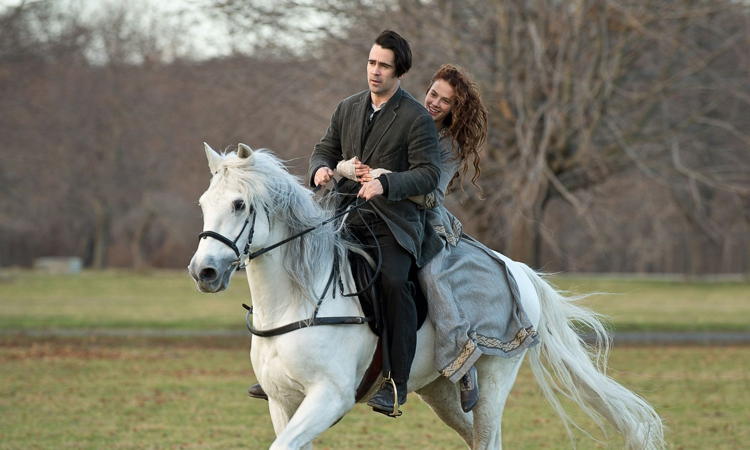By Nguyen Le · February 16, 2014

“This is not a true story. This is a love story” – I have to admit that’s pretty neat to read after the influx of those ‘inspired by’ and ‘based on’ films in the past few months. However, the trailer is unbelievably disappointing and, sadly, so is the next 118 minutes.
Our main character Peter Lake (Colin Farrell – In Bruges, Phone Booth) is a thief, the product of a rough childhood and mafia upbringing. One night, while raiding a mansion, he comes across Beverly Penn (Jessica Brown Findlay – Downton Abbey), a red-haired beauty who hasn’t got long to live due to pulmonary tuberculosis. A romance begins and so are the forces set out to end it, such as mob boss Pearly Soames (Russell Crowe – Gladiator, Man of Steel) who is determined to make Peter pay for his departure and the eventual moment where Peter is transported from 1916 to 2014. But wait, there’s more… Also featured are a white horse with wings and Lucifer as Pearly’s boss (Will Smith (!) – Men in Black, Seven Pounds).
The first thing that comes to my mind – and probably yours too if you read the last paragraph – is how Winter’s Tale is overstuffed. Surprisingly, it is not the case here. Akiva Goldsman clearly has a clear grasp on things, delivering the plotlines in an efficient, streamlined and comprehensible manner, as seen in Cinderella Man, A Beautiful Mind (which got him an Oscar), The Da Vinci Code and I, Robot. However, unlike any of these examples, Winter’s Tale fails to completely hold my attention. The reason? Akiva is also in the director’s seat. The problem is by being so measured in the pacing, which works in romance and drama scenes for most of the time, for the film’s pivotal moments. I find myself not reacting to any of them… at all, a zero sense of escalation when it’s supposed to be there. Furthermore, action sequences are badly directed, in particular one involving cars and ice near the end. I’m fine with them being short and simple, Matthew Vaughn’s Stardust for example, yet there’s a problem if they pack no punches and executed poorly. If I have to sum up Akiva’s directorial debut, I’d go: great job in conjuring emotions and a lot of work needed in heightening them.
While the directing is hit and miss, the acting is solid throughout. Colin and Jessica make a fantastic couple on screen, not only do they look the part but also bring believable chemistry. From the moment they first met, I can see reactions firing off left and right in their voices and their actions. In certain moments, provided that the direction is and remains effective, you really care for them both. As individuals, Colin displays the roguish charm and sensitivity that further cement him as an underrated leading man (minus the haircut). Jessica, on the other hand, portrays innocence and optimism so nicely, so sufficient and at certain times, I forget that her fate has been sealed. Russell Crowe is on full-Irish and villain mode here, so commanding and menacing that I too am scared of Pearly just like his goons. I don’t know if it’s in the script, but Pearly does this little face twitches that significantly add to his “fear-me” factor.
Besides the three central players, the other two big names – William Hurt (as Beverly’s father), Jennifer Connelly (as journalist Virginia Gamely who helps Lake in 2014) and Will Smith – are so in the background they could’ve been played by others. Perhaps they’re here to provide Winter’s Tale additional star-power (as if it didn’t have enough already) or because Akiva has worked with them already – 3 times with Crowe, 3 times with Smith and once with Connelly.
On the technical side of things, Winter’s Tale is a delight. New York, through experienced cinematographer Caleb Deschanel’s eyes (The Patriot, National Treasure, Jack Reacher), is magical in warm yellow, cold blue or snow white. He also takes advantage of the film’s subject of interest – light – to create really memorable frames, especially when actors are around i.e. Jessica, thanks to her red hair, looks absolutely radiant in candlelight. Also helping Caleb in providing a fantastical atmosphere is production designer Naomi Shohan (American Beauty), adorning the sets with fairy tale elements in 1916 and clean lines in 2014. Then there’s the rousing score from, surprise surprise, Hans Zimmer and Rupert Gregson-Williams (the latter called in to finish things up as the former is busy with 12 Years A Slave) that really emphasize the romantic aspect without going overboard and into sentimental territory.
Tales-based films rely a lot on the screenplay and the director’s approach to it, yet unfortunately this is Winter’s Tale weakest aspect. As a result, there’s more break than make but the whole structure hasn’t yet collapsed because of the awesome performances and tech people… but that’s still not good enough. Fairy tales either elate or depress, for Winter’s Tale, it mostly sedates.